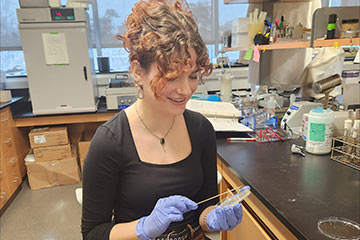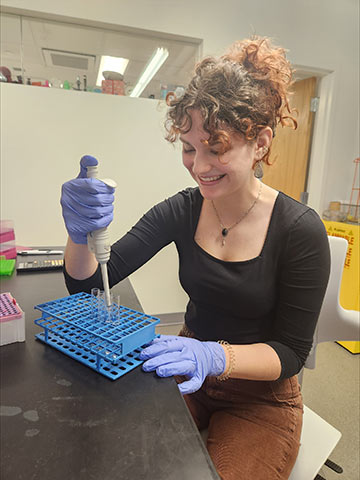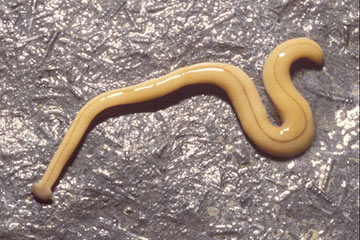Toxic flatworms fuel student research project

12/20/2023
Worms are commonly dismissed as beneath us — literally. But Elizabeth DuBois, a junior biology major at SUNY Cortland, knows these oft-ignored creatures have potential to be underground sensations of the science world.
For DuBois’ honors thesis research project, that means unlocking the secrets of a bacteria found on Bipalium kewense and Bipalium adventitium, toxic varieties of flatworms (planarians). She wants to learn whether those bacteria make a neurotoxin known as tetrodotoxin that’s produced by the hammer-headed worms and marine animals like pufferfish.
“I’m motivated by an interest in learning new things about science,” DuBois said. “Sometimes it can definitely be frustrating. You have things that won’t go right, or you were expecting a different outcome. But the thing about that is that when you weren’t expecting an outcome, you learn something new. I’m really interested in my project now and it’s fun.”
Once the toxin is better understood, DuBois expects it could be used to improve a range of medical treatments, including pain relievers, and create new ways to treat the effects of tetrodotoxin exposure itself.
Christa Chatfield, a professor in the Biological Sciences Department, is the primary advisor and mentor for DuBois’ research, and provides her with lab space and materials. She said the microbes being studied are almost a “complete unknown,’” which makes the test results even more exciting as they come in.

“Her work is progressing nicely,” said Chatfield, who noted she and DuBois would soon have data on the identity of bacteria she has isolated from the skin of two planarian worms she sampled this semester. “She isolated around a dozen unique species, and we are identifying them using genetic sequencing. She has been able to get a lot of success in the PCR (polymerase chain reactions) needed for the sequencing, which can be challenging with samples of unknown species identity.”
Peter Ducey, a distinguished teaching professor in the university’s Biological Sciences Department, who has contributed to planarian research for decades and been used as an expert on national television, noted that tetrodotoxin has been studied for decades due to its impact on humans and other animals. But how it’s created by organisms has somehow remained a mystery.
“The project is fascinating in that it’s addressing questions whose answers can have implications for many areas of biology, ranging from the biosynthesis of medically important neurotoxins to the evolution of ecologically significant invasive species,” Ducey said.
As part of her project, DuBois takes samples of planarian skin provided by Ducey and cultures them. Then she gets DNA samples from the resulting bacteria before finally identifying the bacterial species.
Once complete, DuBois’ research will be a valuable building block toward both future studies and, she says, for her future career plans.
“I want to study microbiology and immunology in grad school, or molecular biology. Hopefully, I’ll get my Ph.D. and then, in the long run, I think I’ll probably become a professor and run a lab of my own.”
DuBois’ research will continue in the spring semester with support from a national grant she earned from the Beta Beta Beta (Tribeta) Biology Honors society, along with SUNY Cortland’s new Biology Alumni-Supported Undergraduate Research (ASUR) grant and Student Progress in Undergraduate Research (SPUR) grant.

The financial support has helped fund needed research equipment, including an ELISA (enzyme-linked immunosorbent assay) kit that DuBois says is specific to her experiments and vital for accurate analysis.
As to the question of how a person becomes intrigued by the largely unseen invertebrates in the first place, DuBois credits class time with flatworm fan Ducey. He in turn has enjoyed seeing the growth of a new scientist.
“I have been very impressed with how Elizabeth combines her creativity and her scientific reasoning and training to everything she does,” Ducey said. “I’m eager to see how she will make real contributions in science with her unique perspectives and investigative skill sets.”

